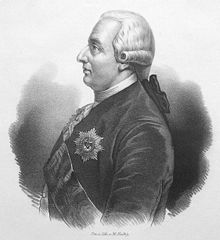Christian Gotthelf from Gutschmid
Christian Gotthelf von Gutschmid (born December 12, 1721 in Kahren near Cottbus , † December 30, 1798 in Dresden ) was an Electoral Saxon minister, baron , Saxon theologian , educator and politician .
Life
The son of a pastor studied theology and later law. In 1750 Gutschmid received his doctorate as Dr. jur. with a dissertation on the economic benefits of free trade . As successor to Karl Ferdinand Hommel , he took over the full professorship of feudal law at the University of Leipzig in 1756 . He was director of the Secret Archives from 1762 to 1765 and - although mostly living in Dresden - from 1762 to 1771 mayor of Leipzig . In Dresden's suburb of Leipzig, a street in the Scheunenhof district has been named after him since 1900 . Appointed cabinet minister in 1790 , he initiated several reforms of the judiciary in Saxony, including the abolition of torture . He donated a gift of 2000 ducats from Emperor Leopold as a scholarship for sons of preachers from Austria studying at Saxon universities. In 1776 he came into the possession of Kleinwolmsdorf near Radeberg through inheritance .
Gutschmid had five sons, of whom Christian Friedrich, Gottlieb August, Johann Wilhelm and Christoph Sigismund later made a name for themselves. He died in Dresden in 1798 and was buried in the Johanniskirchhof . The grave has not been preserved.
Fonts
- Christian Gotthelf Gutschmid: De favore commerciorum liber primus . Leipzig 1750.
literature
- Heinrich Theodor Flathe : Gutschmid, Gotthelf . In: Allgemeine Deutsche Biographie (ADB). Volume 10, Duncker & Humblot, Leipzig 1879, p. 221 f.
- Bad, Horst: Gutschmid, Christian Gotthelf. In: New German Biography (NDB). Volume 7, Duncker & Humblot, Berlin 1966, ISBN 3-428-00188-5 , p. 349 ( digitized version ).
Individual evidence
- ^ Streets and squares in the Leipzig suburb. Retrieved April 27, 2014 .
- ^ Thomas Nicklas: Approaches to reform under the sign of the economy: Kursachsens Rétablissement . In: Eberhard Laux, Karl Teppe (ed.): The modern state and its administration . 1998, p. 93 ( limited preview in Google Book search).
Web links
- Gottlieb August Freiherr von Gutschmid in the Stadtwiki Dresden , eldest son of Christian Gotthelf von Gutschmid
- Christoph Sigismund Freiherr von Gutschmid in the Stadtwiki Dresden , second youngest son of Christian Gotthelf von Gutschmid
| personal data | |
|---|---|
| SURNAME | Gutschmid, Christian Gotthelf from |
| BRIEF DESCRIPTION | Saxon theologian, educator and politician |
| DATE OF BIRTH | December 12, 1721 |
| PLACE OF BIRTH | Kahren near Cottbus |
| DATE OF DEATH | December 30, 1798 |
| Place of death | Dresden |
